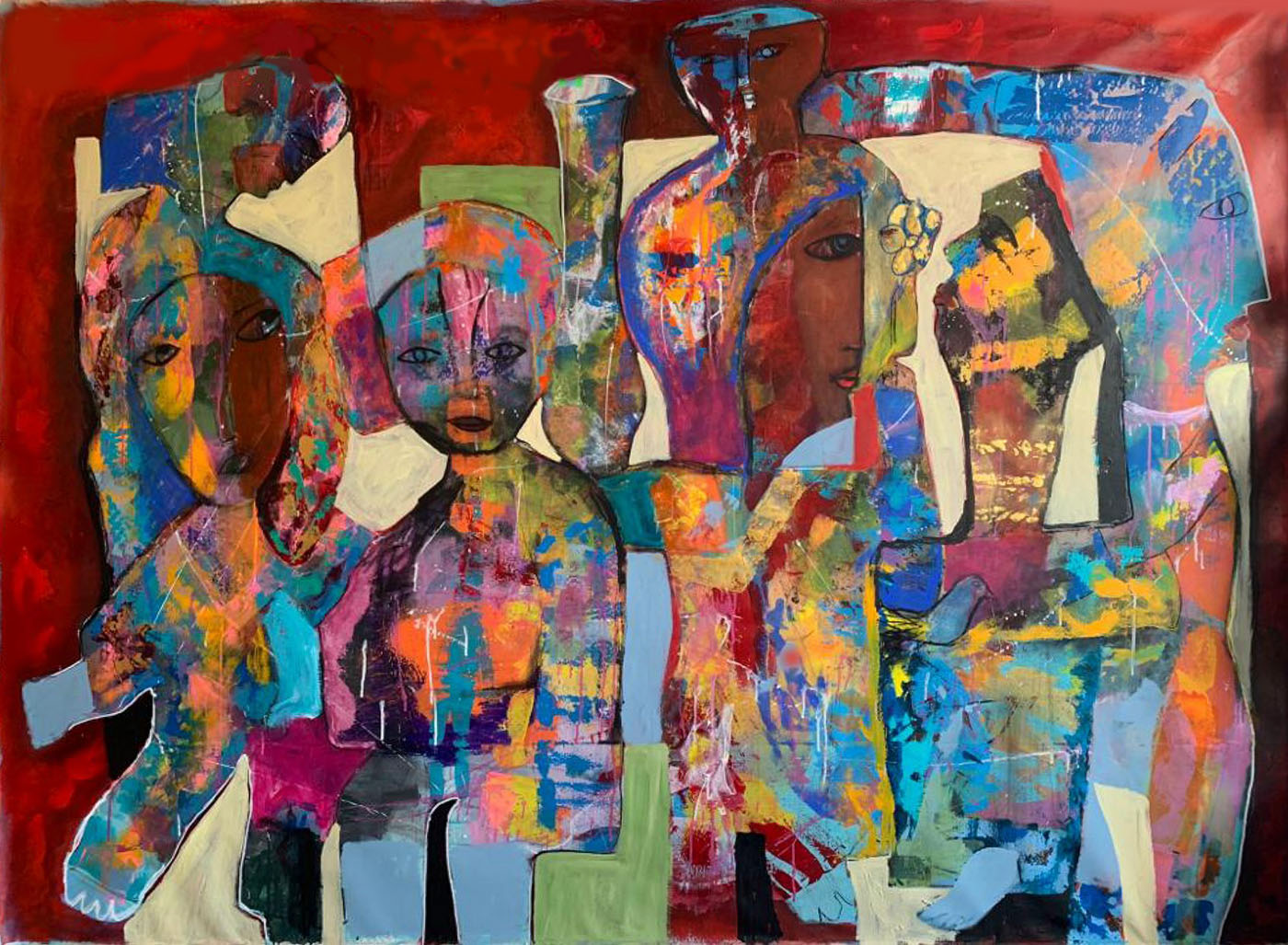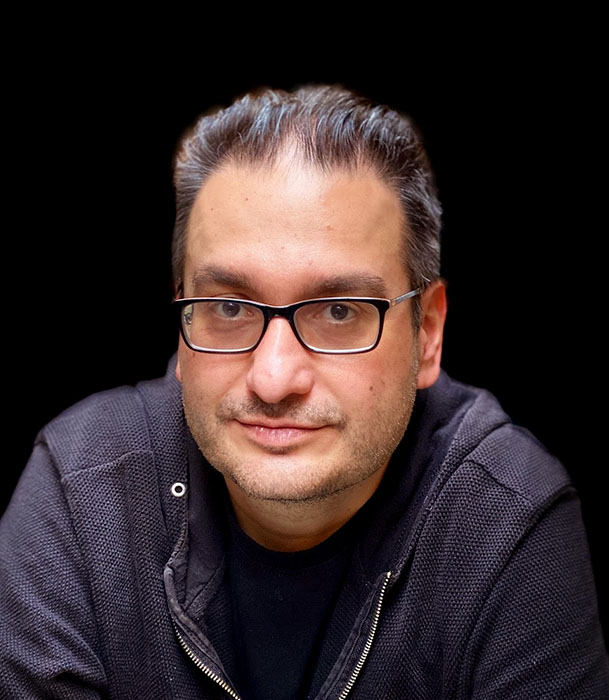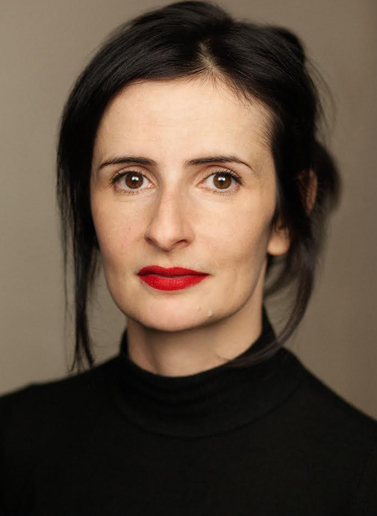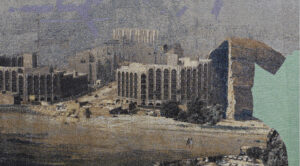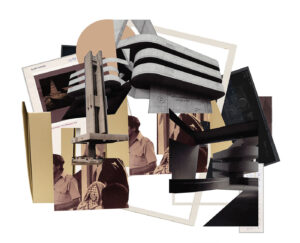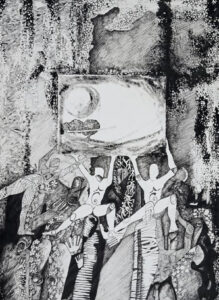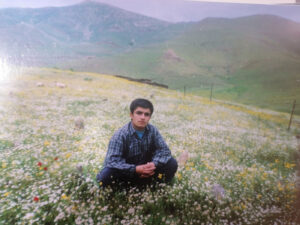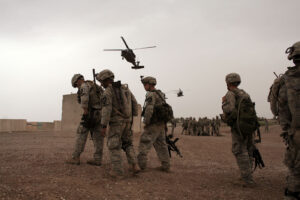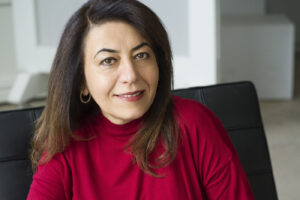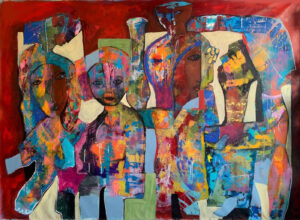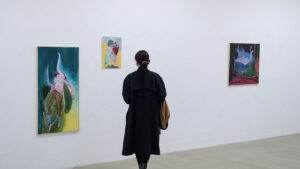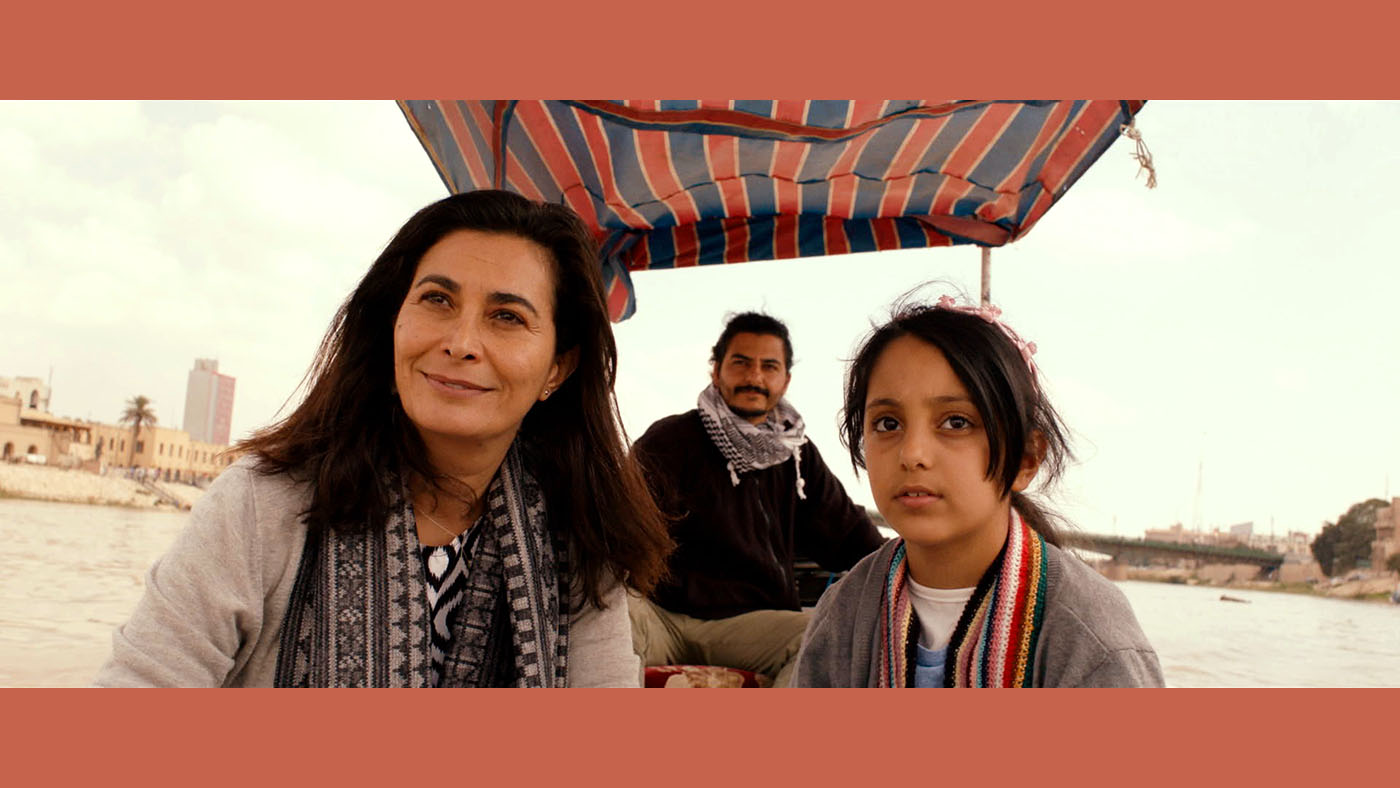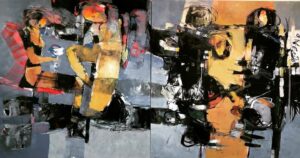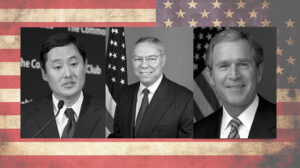This is the first in a new series where Middle Eastern cultural practitioners discuss art and expression. This TMR Conversations is moderated by Malu Halasa.
As Naziha Jones says in her conversation with Abdulrazzak, “The line between comedy and tragedy is whisper-thin.” Her play Baghdaddy draws on the many ages of personal experience when war, exile, and trauma scar a young, impressionable life. Jones is fiercely determined to bring Iraqi experiences to wider audiences.
Hassan Abdulrazak and Jasmine Naziha Jones
Hassan Abdulrazzak—It took me time to recover from watching your remarkable play Baghdaddy. For an Iraqi, it was quite a lot to take in because it revisited the Iraqi past. For people who might be reading this and haven’t seen the play, could you give us a brief overview of what the play is about?
Jasmine Naziha Jones—Baghdaddy is an exploration of my childhood memories of the Gulf War and the subsequent occupation of Iraq. What the play does is to reconcile my childhood memories with an adult understanding of what my dad endured watching the horror unfold from the safety of our home in the UK. It takes my memories and his memories, and explores them in an expressionistic way, with the help of three spirits who act as a chorus.
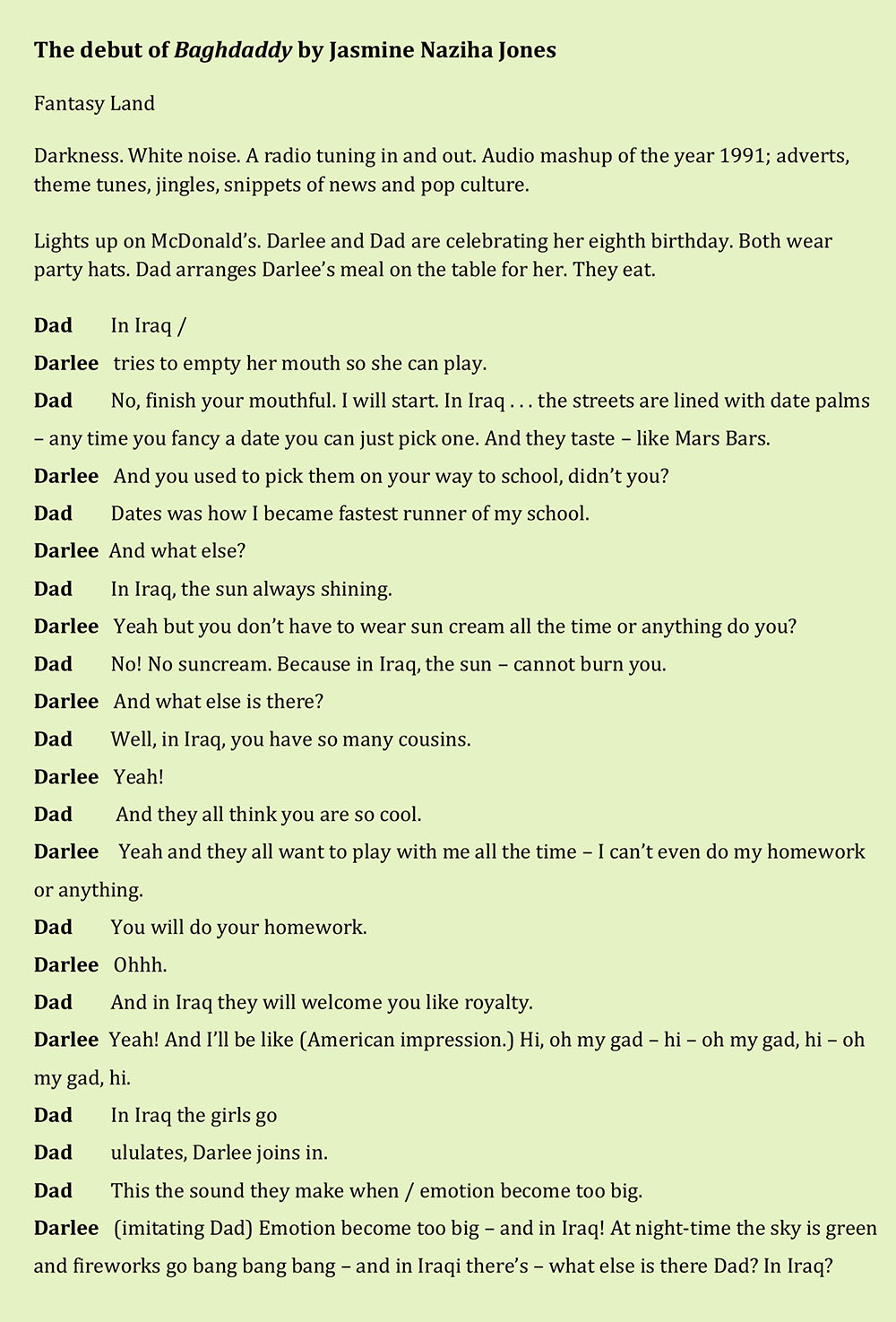
HA—I will get to that, but first I want to ask what motivated you to write the play. You’ve had a long career as an actress. What inspired you to tap into your memories and write about Iraq in this way?
JNJ—I’ve written works since I left drama school, but mostly to perform myself. This is the first autobiographical piece I’ve written. It was the direct result of seeing A History of Water in the Middle East at the Royal Court by Sabrina Mahfouz, which is a testament to how important it is to see diversity of stories on our stages. I think it engenders more people to tell their stories — to see themselves. So I saw A History of Water in the Middle East, and an hour before the performance, I took a workshop with you as well. You gave some very sage advice in that workshop, which was to use your anger as fuel. What you said really made sense to me after I’d seen Sabrina’s play. I felt really angry. I felt galvanized by what I’d seen. I went home, and I wrote the first 10 pages of what would become Baghdaddy.
HA—You’ve said in previous interviews, and it’s a theme that you deal with in the play, that it is very common for second-generation immigrants to secretly process the grief of our elders. It was a statement that stuck with me, coming as I do from Iraq. It is something that I have grappled with. Could you expand a little more on the idea?
JNJ—How do we come to process the grief of our elders? I think it’s because when you inhabit both oppressed and privileged statuses, you aren’t necessarily wholly accepted into one or the other — or you’re possibly sheltered from one reality. Certainly in my house, things weren’t talked about extensively or in detail with the children. There was a certain element of protecting us, but of course you see your parents experiencing these things and you absorb it. As you get older, you start to ask questions of yourself to make sense of it. I try to picture what my dad must have gone through — feeling so awful for him and also awful for myself. I’ve always felt a really strong connection with Iraq. I have a lot of family there. But like many other second gen-ers, I didn’t have anywhere to grieve; I didn’t know how to express my grief. So this play was an expression of my grief as well as an effort to try to understand my dad.
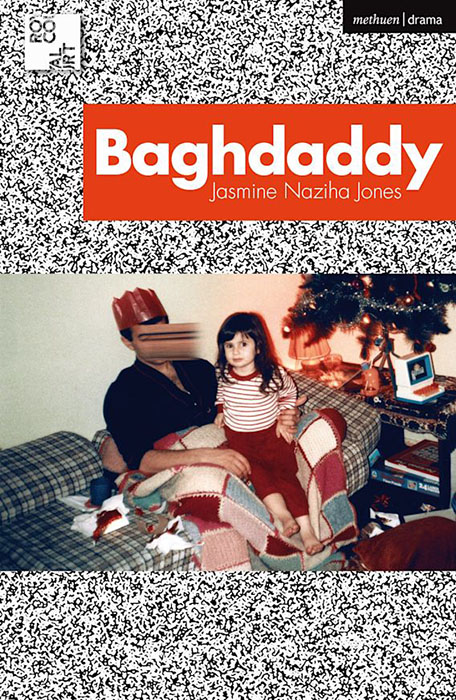
The play taught me that we do secretly process the grief of our elders. You want them to talk about it and say, you must have felt this or you must have felt that. But, instead, you go through the motions of it yourself. I can’t imagine what it’s like to be wrenched from everyone I know and love.
HA—There are so many beautiful things in your play. There is one scene that is silent. It’s a short one, in which the father figure is watching the Gulf War, and he comes out of the bedroom. He walks past the TV several times, I think, in his underwear. It’s a very domestic scene. There’s a moment where he’s almost yawning, and then he’s screaming and goes back into his bedroom.
I remember when I was watching this onstage, it really resonated with me because my mother, going through the Gulf War, was grieving massively. But she would also hide it so that we children wouldn’t panic. She would go into her bedroom and lock the door. The images of this war launched CNN. It was on every night. What you’ve captured really beautifully in the play is the effect of that on Iraqis living away from their homeland. It didn’t come pain-free, even if they were living in safety.
We’ve talked a lot about grief and pain, but I want to highlight to people reading this that Baghdaddy is very funny. In my own play, Baghdad Wedding, which is about Iraq, and which came out 15 years ago, I also used comedy as a vehicle of telling the story of Iraq. It’s a kind of love story with some comedy in the first act, after which things get more serious. I noticed you use that strategy. So I wanted to talk to you about the role of comedy. Why use comedy to tell a story about Iraq?
JNJ—I think that the line between comedy and tragedy is whisper-thin. I was aware of not wanting to be aggressive with my anger or pain. So I found it really useful to employ comedy as a device to speak about these things. You could win trust, but you could also talk about really tragic things. Additionally, I used comedy to destabilize the audience. So the play seesaws between breathtaking tragedy and disarming comedy. To me, that was the Trojan horse of slipping in the underlying message, which was this: Is it possible for you in the audience, in the window of these two hours in this theater, to feel this pain as well? I felt comedy was the best device to deliver that.
HA—Also, I feel it’s a cultural thing, isn’t it, for Iraqis in general — perhaps because of the tragedy that has happened to the country — to have this kind of dark humor, and resort to it. Recently, I watched Maysoon Pachachi’s film, Our River… Our Sky. There was a scene in that film where passengers on a bus in Baghdad are joking about checkpoints ahead. Then, suddenly, gunfire comes into the bus and everybody’s sort of ducking and trying to dodge the bullets. When the gunfire stops, they make further jokes about what has happened. The main character of the film is writing this down, which is Maysoon’s co-writer Irada Al Jabbouri’s way of indicating: “This really happened. This is a slice of life from Iraq that I’ve captured.” A way of dealing with trauma is resorting to humor. So other than Darlee, whom you played on stage, and the father who fell apart — wonderfully played by Philip Arditti — there were also three supernatural figures. Can you tell us a bit more about them, and why you chose to have them in the play, and what they added?
JNJ—When I came home from Sabrina’s play and started writing Baghdaddy, it came to me as three voices speaking about my experience, I guess, in the third person. As the play and my research evolved, they became spirits with different agendas. Their function in the play is that they are a manifestation of an internal argument I’m having with myself: my past self; my younger self; my older, wiser self; and also the destructive self.
They can be menacing. They can be benevolent. They’re sometimes unreliable. But they also serve as the cogent thread that holds this play together because we are flipping in and out of memories, and we’re flipping in and out of decades. So they really helped to place us in time and space. They assume various personality roles, and play lots of different characters as well. They guide Darlee through the 1980s, the 1990s, and the early noughties. They were incredibly useful. They serve as a chorus.
It was important to have this chorus to make things explicit to the audience. It’s not a subtle piece of work, but it’s purposefully not subtle. Because I felt my time on this stage was limited, I needed to be really clear and really bold in what I was saying. The chorus helped with that clarity.
HA—I think they also help in managing the time because you covered all the major wars Iraq has gone through. You covered the Iran–Iraq War, the Gulf War, and then the recent Iraq War. That device was really just so wonderful in terms of enabling you to jump-cut between situations and scenarios. You packed so much in.
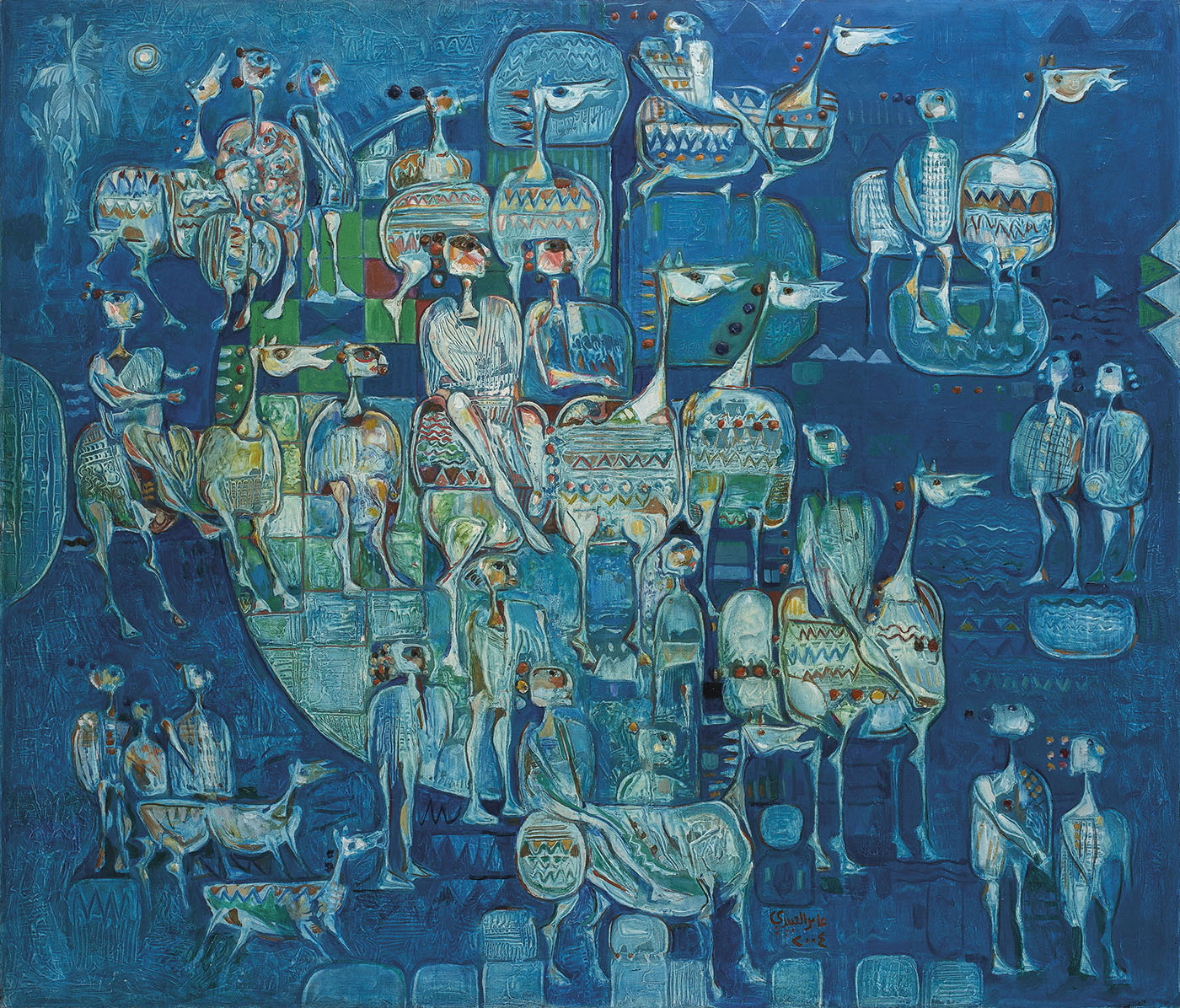
JNJ—It’s a coming-of-age story that spans decades. Instead of using complicated sets and lighting, we have the chorus, as well as other theatrical elements. But it’s mostly the storytelling from the chorus that depicts time and space most clearly out of all the elements that we’re using.
HA—The play deals, in part, with the question of identity of somebody who’s Iraqi, but Darlee, the figure you play, the young girl at the heart of the relationship with her dad is torn between two worlds, as is the father himself. They’re in between, and I know from interviews you’ve given that you dislike the question, “Have you been to Iraq?” If it comes from an Iraqi, you called it — I love this phrase — “a barometer of authenticity.” So, could you speak about this identity question, and how you deal with it?
JNJ—That question, “Have you been to Iraq?” was asked in a Q&A after the play. I found it ironic because the play thematically covers these questions being asked of the protagonist Darlee: “Have you been there?” “Do you have family there?” “Can you speak Iraqi?” These questions in the play are used to squash, belittle, and minimize Darlee’s identity.
What I was doing there was exploring a very common theme experienced by many mixed-race people, which is: There seems to be this desire by others for you to quantify your authenticity. The person who’s asking that question gets to decide based on this arbitrary list of questions: “How authentic you are?” “Do you speak the language?” “Have you been there?” “Do you have relatives that live there?”
What this so painfully does is undermine the feelings of your life experience — the experience that I was trying to show in the play. So to be asked that question, after the audience sat through two hours of a play that was exploring these themes, to me felt quite sad. I declined to answer the question because it’s not important. I’m sure that person meant well. But it’s something that has been asked a lot throughout my life. I’m not into other people deciding that for me anymore.
HA—It’s one thing when it comes from Iraqis; it’s got that edge to it. You also deal with that really well in the play when it comes from non-Iraqis, when it comes from English people, for example. That question of “Where do you come from?” and that kind of sometimes fake sympathy of “Oh, that must be really terrible” from people who are not really engaged.
The play also raises the question, one I used to answer sincerely when I was asked: “What do you think about Saddam?” This is addressed hilariously at the beginning of the play, and then in a serious way, in the second half. You set it up with comedy in the first half and then you flip it in the second half, and challenge the audience with it, through the use of a direct address, which changes the style of the play. That monologue that deals with this issue of Saddam Hussein — how did that come about for you? Was that a natural progression in the writing? Or was it something that developed as you were finessing the play?
JNJ—Darlee is on a journey of understanding. And these are the questions that are asked of her in her childhood. “What do you think of Saddam?” They are not questions she can make sense of, at that age. They are questions she internalizes. So there’s a speech at the end of the play where Darlee is at a university interview, and she’s asked, “What do you think of Saddam?”
For the first time, she turns the question around on the people who are asking her, and she asks them: “What do I think of Saddam? Well, hang on a minute! Obviously, he’s a monster. But what do you think of the sanctions on Iraq?” And the play talks about the West’s hand in the destruction of Iraq.
What I’m trying to do is ask the audience to consider the West’s role in that as well as Saddam’s. It was really important for me to talk about the sanctions because the sanctions are the hidden agony of Iraq. By the time the invasion happened, the country was already existing in medieval conditions. The narrative that was spun by the Western media was that, you know, Saddam had done all of that to the people of Iraq. Well, yes, he’d done many terrible things. But the West had a big hand in preparing the country to be defeated quite easily in this invasion. I just wanted the audience to know about the hidden agony of the sanctions and to consider both sides of the story. Really, there are such horrific details, and what I covered in the play was only a small amount.
I wanted the play to enlighten as well as entertain. I felt that this was my one shot to give a voice to my people.
HA—The sanctions are a forgotten episode of history. I remember going to a presentation at the Arab British Centre by an English historian who has written a book about Iraq — I won’t mention specifics of who this person is, but he gave this whole presentation of the book and left out 13 years of sanctions. I raised the question, “What happened then?” He gave the impression that he thought this was a minor episode. But everything that happened subsequently to Iraq, in terms of the collapse of the country, the seeds of all that were sown in the sanction years. I touched on that in Baghdad Wedding. There’s a scene when somebody returns to Iraq, and somebody else tells them about the books that were sold to make ends meet. This was one of the striking images at the time of Iraq: that many academics, for example, had to sell their books to survive, which was heartbreaking for them.
JNJ—And, you know, not just books. I mean, people were literally selling bricks from the walls in their houses, as well as doors and bits of carpet. I just don’t think people realize the extent of that. I first heard about it in the 1990s. I used to accompany my dad. Pre-internet, he used to go and give speeches and tell people firsthand, “Look, this is what the sanctions are doing.” I’m there as a little child holding all of this information, telling my friends on the playground. What I’m trying to communicate with this play is this child holding on to all of this, knowing all of this and not knowing what to do with it. It all comes out in the speech at the end. The systematic destruction was so calculated. I mean, God, it’s tantamount to genocide — the amount of people who died.
HA—When the Iraq War happened in 2003, there was a slew of plays written mainly by Western writers, and also American films, very often from the soldiers’ point of view, or from the point of view of a middle-class family debating a war that is far removed from them. For me, that was part of the motivation for writing Baghdad Wedding. I had seen David Hare’s 2006 play Stuff Happens, which was all about the politicians and the political sphere. What really annoyed me about it is that it ended on an apparently verbatim quote from an Iraqi, who said: “Well, if we don’t sort out our own mess, this is what happens to us.”
That was almost like your moment with Sabrina Mahfouz’s play, which galvanized you in a positive way to write your play. That was my moment, the one that galvanized me to write Baghdad Wedding because I felt the Iraqis were very minimal in Hare’s play. They didn’t have enough agency in Stuff Happens. I felt there was something missing.
I wanted to ask you more about the production of your play because I think it’s quite interesting for the Royal Court to put on a play about Iraq right now when things have moved on. People are looking at the Ukraine War.
JNJ—I took part in the intro to playwriting course at the Royal Court. At the end of that I submitted a draft of Baghdaddy. I got some feedback, and I submitted another draft. So it was really through that scheme that I got programed. Why did they want to program it? You probably have to speak to the literary department. I would argue that although times have moved on, we are only now making sense of what’s happened. We still have many plays about the Holocaust and the fallout of that. This is generational trauma that we’re speaking about. It doesn’t just get washed away with the sands of time. You know, it will be passed on for generations. And I think this is a really important part of our history. It needs to be documented in art by Iraqi voices. As you say, we didn’t get to speak that much.
So for the Royal Court to platform this story, to platform an Iraqi voice, is so important to me and to other Iraqi people. I cannot tell you the amount of people who came up to me personally. Some Iraqi people on the bus from Newcastle traveled to the play, saw it, and came back to see it with their relatives and friends. They were saying, “Thank you for telling this story. It’s my story too.” They felt so seen.
Also other people who were not from the same culture, but from similar backgrounds, were like, “It’s not my story, but it’s so similar to mine.” A lot of people felt seen. I think you can’t underestimate the healing of public validation.
HA—I totally hear you on that. I had similar feedback for Baghdad Wedding by Iraqis who lived in Britain and felt they didn’t have that validation. But I really felt that much more when the play went to Australia, and it was performed in Sydney at the Belvoir St Theatre. There was a lot of negative press about the Iraqi diaspora. When they came to see the play, they thanked me and said, “You’ve presented us in a different light.” That’s a moment I’ll always treasure.
I think you make a very good point that there’s so much to explore. The Iraq War is such a huge event; it is almost the equivalent of World War I at the beginning of the 20th century. It has such resonances for the region and for the countries that were involved. I think there still are many more stories that need to be told about it.
You had a wonderful cast for Baghdaddy. Amongst them was fellow Iraqi actress, Hayat Kamille. I wanted to ask you about collaborating with Hayat, and about having another Iraqi in the cast.
JNJ—It was so great to collaborate with another Iraqi actor. It was really important to me that we tried to have as much representation as possible. When I was researching the play, the Arab British Centre very kindly facilitated a set of coffee mornings during my research stages, and I spoke to people from the diaspora and met Hayat. Coincidentally, she was an actor. So, when the play got programed, we called her in and the stars aligned. She brought so much to the role. It was very comforting for me to have somebody else there, to have her support every night. We had an unspoken understanding — not least because, for purely selfish reasons, I was performing in the play every night. We shared a dressing room as well. You know, some nights were really difficult, and I’d come offstage upset. To have her there and just to share a hug and realize that she knows how much was taken from us meant I just didn’t have to explain myself. So I was absolutely delighted to be able to work with her.
Malu Halasa—I just wanted to ask both of you: Because Iraq is not often represented onstage, do you feel like there’s more of an interest now? Is there a community of Middle Eastern playwrights in London? Or are the two of you forging your own separate ways in an attempt to get the material shown?
HA—There is now a growing community of Middle Eastern writers. There’s a wonderful WhatsApp group for Arab writers that we are all on. People exchange ideas and messages. The younger generation that’s coming up is really enthusiastic and hungry. A lot of their focus is more on film and TV. They’re trying to break into that. But also they have an interest in theater. In that WhatsApp group, there are people like Saeed Taji Farouky, who is a wonderful documentary film director. He’s often a great commentator on the arts scene, and we’ve had very vigorous debates about the films Farha and The Swimmers. People feel proud that these films are coming out. But at the same time, they’re also debating them in a rigorous way. When I started, there wasn’t this kind of community. How was your experience with the community, Jasmine?
JNJ—Mainly through MENA Arts UK, an organization set up in the last three or so years. They do mixers, and organize outings to plays. They organized a night at my play. You get reduced tickets, and we did a Q&A afterwards. The group is extremely proactive. It’s a great place to meet people and network. It’s wonderful to be part of something, having floated through life not feeling like part of a community for so long.
HA—However, I feel there’s still a way to go in terms of putting more Arab and Middle Eastern work out there in the UK. Before the pandemic, the playwright Hannah Khalil and I tried to set up a company. We were inspired by the theater company Golden Thread Productions in San Francisco, which is dedicated to Middle Eastern culture and identity. They’ve put on some of both my and Hannah Khalil’s work. There isn’t an equivalent production company in the UK. There are companies for black artists, and for artists of Indian or Pakistani heritage, but there isn’t really one for the Middle East in the UK. Because then it wouldn’t be just individual writers like us trying to pitch and hoping and praying that theaters will give us the space. It would be more organized advocacy. A company that demands: You have to give us that space.
JNJ—Hassan, what kind of stories would you hope a company like that would be telling? Would it be Middle Eastern-centric stories? Or could it be stories about the human experience, so to speak?
HA—For me, everything under that banner. It certainly shouldn’t just be Middle East-centric. I was speaking, for example, with the Iraqi director Diyan Zora. She said that, often, what we’ve written about the Middle East has tended to be very political. We haven’t had, for example, a family drama that is, say, in the tradition of American plays — a family gets together, things come out and all of that. Diyan is working on such a play.
Yet, Jasmine, your play, Baghdaddy, obviously had the father-daughter relationship. I’ve written a play, which I’m still trying to get produced, called A Fire Blazing Brightly, about an Iraqi family and their dynamics. But there is also a political element in the play, with certain scenes set in Iraq. So it’s not quite a straightforward family drama.
As for the company, I think it should be anything that is within this code. Another play that I’m working on, called Retreat, is about trauma and depression. But I’m coming at it from a comedic angle. The play is not entirely about the Middle East experience. It’s taking things from that background and taking things I’ve seen in my family and my parents, and so on, but trying to create a drama that will speak to many people about depression, for example, and how that can manifest itself. So I think we can tap into our experiences in multiple ways.
That’s why I go back to the idea that we need a company. Hannah Khalil’s play Hakawatis: Women of the Arabian Nights at the Globe Theatre included contributions by Hanan al-Shaykh, Suhayla El-Bushra, and Sara Shaarawi. It was a brilliant reimagining of The Arabian Nights told through female characters supporting Scheherazade, who is offstage. That was co-produced at the Globe Theatre with Tamasha, a theater production company that generally has more focus on South Asia. Having that gave the play more power. I think we need more companies like that to make an impact and to further diversify the landscape.
MH—I want to thank you both for this intriguing conversation. I was particularly taken by Jasmine’s comments on explaining one’s self, or proving one’s authenticity. I think those pressures are placed on Middle Eastern cultural practitioners, and we internalize them. The question now is how to rid ourselves of those pressures, and go straight to what the two of you are essentially talking about, which is storytelling. Because that’s the key that unlocks emotion, that unlocks empathy, and gives us everything we want to get from our stories and what we hope our stories will do. That is the challenge for Arab writers and playwrights today, no matter their backgrounds or where they’re writing, whether in London or Baghdad.



